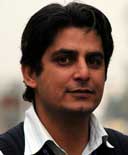Scenes from Pakistan’s 9/11 decade |
"Washington cannot humiliate Pakistan by trampling over its parliamentary resolutions against arbitrary killings through drone-fired missiles," said retired Air Marshal Masood Akhter, channeling the national outrage against the extensive U.S. drone program in western Pakistan. He added that ground conditions were unfavorable for a land operation in the tribal areas, especially North Waziristan, as the U.S. wants. He cited the public anger there at the national government and its allies in Afghanistan.
Last month, the London-based Bureau of Investigative Journalism released a study reporting that 168 children had been killed in 291 drone strikes in Pakistan's tribal areas since June 18, 2004. Roughly 80 percent of those strikes occurred during Barack Obama's presidency.
• • • • •
As with NATO's controversial " night raids" that have so enraged Afghans, many Pakistanis see the drone attacks as violations of privacy and the Pakhtun code of conduct, locally called "Pakhtunwali", justifying revenge.
A senior Pakistani official, on the condition of anonymity, discussed the case of Bin Yameen, perhaps the most feared militant in Pakistan's Swat region, who was driven by a passion for revenge against the Pakistani military that had "invaded" his home.
"Bin Yameen felt disgraced and dishonored for strangers breaking into his home at night while he was asleep with his family and after his release from jail, he joined the extremists in Swat valley to slaughter captured security officials," the source recalled.
"Whereas the first war brought Afghans, heroine, and Kalashnikovs in Pakistan, it also left a deep imprint of F-16 on the Pakistan mind, probably the most painted foreign object on our colorful buses and trucks," said Malik Ramazan, a retired high school principal in central Pakistan's Multan city, of the American fighter jet that became closely associated with the U.S. and the war. "Now the Americans would be leaving images of dreadful drones as an embarrassment to our sovereignty."
There are few obvious Americans here for angry militants and would-be militants to target for revenge, so it is Pakistan's security officials, viewed as complicit, and civilians who are often made to pay.
Last month, a U.S. drone killed 18 people in Miranshah, a city in the North Waziristan tribal area. The next morning, two suicide bombers claimed the lives of seven policemen in Peshawar.
The tit-for-tat revenge war extends to the country's farthest southern corner, the port city of Karachi, where containers of NATO military supplies are loaded on to Afghanistan-bound trucks. The trucks are frequently targeted by militants in Pakistan. "I am a lucky one to survive with NATO cargo and sometimes fuel tankers as you never know when the attackers emerge to disappear," said Ayub Afridi, who has been driving the 18-wheelers for almost two years. Afridi's family has been pressuring him to quit because they say he is serving the American occupation.
• • • • •
Amina Masood Janjua has been trying to find her husband since 2005. Once a housewife, Janjua's organization, Defence of Human Rights Pakistan, has registered the cases of over 900 missing people in Pakistan..
"While pressing the government and the courts for our loved ones, we are also trying to maintain the families' faith in the system lest they lose hope and become too desperate," Janjua told me. She has been able to locate some missings persons, sometimes by taking judicial action to pressurePakistani intelligence agencies to set them free.
Even if the country's superior courts now enjoy unprecedented autonomy, judicial process has been painfully slow and, often, the prosecution ill-prepared.
"While there are hundreds of proven militants behind the bars after Swat operation, we fear an equal number to be innocents with no evidence or proof against them," said Shaukat Aziz Siddiqui, a human rights lawyer in Rawalpindi. He worried that jails, where hardened militants and suspects are not separated, are becoming centers of radicalization.
Despite mushrooming checkpoints in Islamabad, insecurity and terrorism continue to grow.
This article was written for The Atlantic.com
- « first
- ‹ previous
- 1
- 2
- 3








 Naveed Ahmad is an investigative journalist with special focus on diplomacy, security and energy politics. He jointly heads
Naveed Ahmad is an investigative journalist with special focus on diplomacy, security and energy politics. He jointly heads 
Post new comment